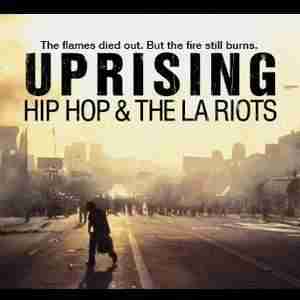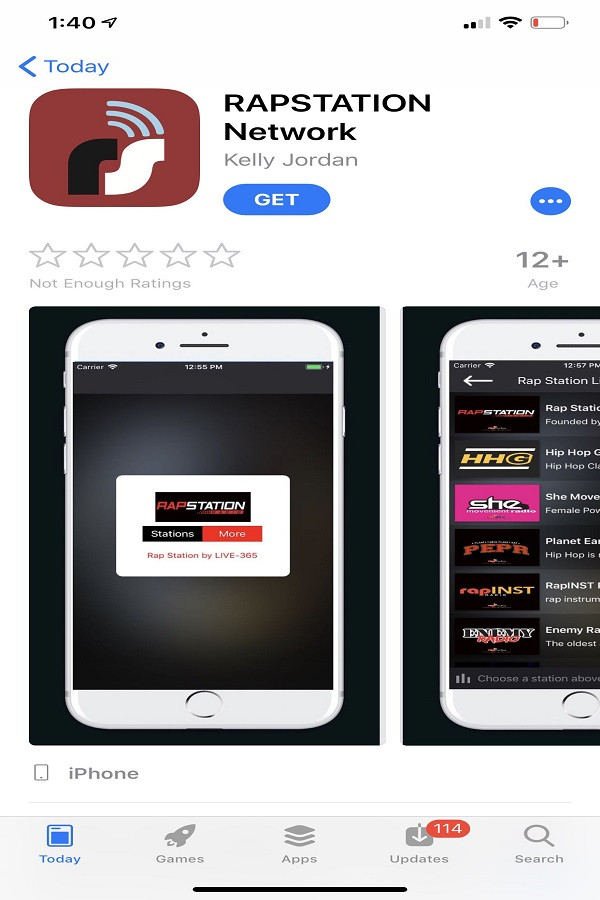 In commemoration of the 20-year-anniversary of the Los Angeles riots, journalist turned filmmaker, Mark Ford, recaptures the events, as seen through the eyes of those who lived it. Uprising: Hip Hop & The LA Riots chronicles how a simmering beef with police reached its boiling point.
Ford screened the film at the Grammy Museum in Los Angeles Thursday (April 26) night, followed by a panel discussion with Kurupt, Too Short, John Singleton, Arsenio Hall, Henry Watson, Mathew McDaniel, and Cheo Hodari Coker; all of whom were featured in the documentary.
Narrated and executive produced by Snoop Dogg, Uprising takes a look at Hip-Hop's role in foreseeing and encouraging the riots that cost the city of Los Angeles $1 billion, and took 53 lives. Notable rap records like N.W.A.'s "F**k tha Police," and Ice Cube's "Black Korea" broadcasted the climate in Southern California neighborhoods where gang violence and racial tension divided the area. "Back then regardless if I was writing songs about some pimp stuff, or N.W.A. was rapping about chasing girls, there was a part [where] every rapper mentioned what was going on in your surroundings," said Too Short, during the discussion.
On March 31, 1992, Rodney King's vicious beating at the hands of LAPD officers revealed to the nation the racism and obvious abuse of power within the department. When his attackers got off without punishment the people of L.A. had finally had enough. Among those fed up was Henry Watson, one of the men captured by a news chopper beating Reginald Denny, a construction truck driver passing through South Central, L.A. Like many in his neighborhood Watson was enraged over the King verdict, and targeted Deny because he---like the freed officers---was white. "It's hard for me to come to terms with it," he revealed. "I know we've come 20 years, we should have changed but we haven't. I can't explain to you what happened, it's just something that happened. It is what it is."
Looking back many of the men living through, or somehow involved in the riots, have changed their mindsets on the damage done by the turmoil. "When you're young you don't see the seriousness of it," noted Kurupt. "It's more along the lines of joining in with everybody and you don't really get the cause. Looking at it now it's like I wouldn't want my kids to be involved in that." Citing the death of Trayvon Martin as an example, the West Coast rapper feels little has changed over the last two decades. "It was kind of like they [the police] were like, 'let these n***ers calm down and then we're going to get back to our regular scheduled programming.' We got a lot more further to go."
Uprising: Hip-Hop & The LA Riots airs on Tuesday, May 1 at 9 p.m. EST, on VH1.
In commemoration of the 20-year-anniversary of the Los Angeles riots, journalist turned filmmaker, Mark Ford, recaptures the events, as seen through the eyes of those who lived it. Uprising: Hip Hop & The LA Riots chronicles how a simmering beef with police reached its boiling point.
Ford screened the film at the Grammy Museum in Los Angeles Thursday (April 26) night, followed by a panel discussion with Kurupt, Too Short, John Singleton, Arsenio Hall, Henry Watson, Mathew McDaniel, and Cheo Hodari Coker; all of whom were featured in the documentary.
Narrated and executive produced by Snoop Dogg, Uprising takes a look at Hip-Hop's role in foreseeing and encouraging the riots that cost the city of Los Angeles $1 billion, and took 53 lives. Notable rap records like N.W.A.'s "F**k tha Police," and Ice Cube's "Black Korea" broadcasted the climate in Southern California neighborhoods where gang violence and racial tension divided the area. "Back then regardless if I was writing songs about some pimp stuff, or N.W.A. was rapping about chasing girls, there was a part [where] every rapper mentioned what was going on in your surroundings," said Too Short, during the discussion.
On March 31, 1992, Rodney King's vicious beating at the hands of LAPD officers revealed to the nation the racism and obvious abuse of power within the department. When his attackers got off without punishment the people of L.A. had finally had enough. Among those fed up was Henry Watson, one of the men captured by a news chopper beating Reginald Denny, a construction truck driver passing through South Central, L.A. Like many in his neighborhood Watson was enraged over the King verdict, and targeted Deny because he---like the freed officers---was white. "It's hard for me to come to terms with it," he revealed. "I know we've come 20 years, we should have changed but we haven't. I can't explain to you what happened, it's just something that happened. It is what it is."
Looking back many of the men living through, or somehow involved in the riots, have changed their mindsets on the damage done by the turmoil. "When you're young you don't see the seriousness of it," noted Kurupt. "It's more along the lines of joining in with everybody and you don't really get the cause. Looking at it now it's like I wouldn't want my kids to be involved in that." Citing the death of Trayvon Martin as an example, the West Coast rapper feels little has changed over the last two decades. "It was kind of like they [the police] were like, 'let these n***ers calm down and then we're going to get back to our regular scheduled programming.' We got a lot more further to go."
Uprising: Hip-Hop & The LA Riots airs on Tuesday, May 1 at 9 p.m. EST, on VH1.
Uprising: Hip-Hop & The LA Riots special on VH1
 In commemoration of the 20-year-anniversary of the Los Angeles riots, journalist turned filmmaker, Mark Ford, recaptures the events, as seen through the eyes of those who lived it. Uprising: Hip Hop & The LA Riots chronicles how a simmering beef with police reached its boiling point.
Ford screened the film at the Grammy Museum in Los Angeles Thursday (April 26) night, followed by a panel discussion with Kurupt, Too Short, John Singleton, Arsenio Hall, Henry Watson, Mathew McDaniel, and Cheo Hodari Coker; all of whom were featured in the documentary.
Narrated and executive produced by Snoop Dogg, Uprising takes a look at Hip-Hop's role in foreseeing and encouraging the riots that cost the city of Los Angeles $1 billion, and took 53 lives. Notable rap records like N.W.A.'s "F**k tha Police," and Ice Cube's "Black Korea" broadcasted the climate in Southern California neighborhoods where gang violence and racial tension divided the area. "Back then regardless if I was writing songs about some pimp stuff, or N.W.A. was rapping about chasing girls, there was a part [where] every rapper mentioned what was going on in your surroundings," said Too Short, during the discussion.
On March 31, 1992, Rodney King's vicious beating at the hands of LAPD officers revealed to the nation the racism and obvious abuse of power within the department. When his attackers got off without punishment the people of L.A. had finally had enough. Among those fed up was Henry Watson, one of the men captured by a news chopper beating Reginald Denny, a construction truck driver passing through South Central, L.A. Like many in his neighborhood Watson was enraged over the King verdict, and targeted Deny because he---like the freed officers---was white. "It's hard for me to come to terms with it," he revealed. "I know we've come 20 years, we should have changed but we haven't. I can't explain to you what happened, it's just something that happened. It is what it is."
Looking back many of the men living through, or somehow involved in the riots, have changed their mindsets on the damage done by the turmoil. "When you're young you don't see the seriousness of it," noted Kurupt. "It's more along the lines of joining in with everybody and you don't really get the cause. Looking at it now it's like I wouldn't want my kids to be involved in that." Citing the death of Trayvon Martin as an example, the West Coast rapper feels little has changed over the last two decades. "It was kind of like they [the police] were like, 'let these n***ers calm down and then we're going to get back to our regular scheduled programming.' We got a lot more further to go."
Uprising: Hip-Hop & The LA Riots airs on Tuesday, May 1 at 9 p.m. EST, on VH1.
In commemoration of the 20-year-anniversary of the Los Angeles riots, journalist turned filmmaker, Mark Ford, recaptures the events, as seen through the eyes of those who lived it. Uprising: Hip Hop & The LA Riots chronicles how a simmering beef with police reached its boiling point.
Ford screened the film at the Grammy Museum in Los Angeles Thursday (April 26) night, followed by a panel discussion with Kurupt, Too Short, John Singleton, Arsenio Hall, Henry Watson, Mathew McDaniel, and Cheo Hodari Coker; all of whom were featured in the documentary.
Narrated and executive produced by Snoop Dogg, Uprising takes a look at Hip-Hop's role in foreseeing and encouraging the riots that cost the city of Los Angeles $1 billion, and took 53 lives. Notable rap records like N.W.A.'s "F**k tha Police," and Ice Cube's "Black Korea" broadcasted the climate in Southern California neighborhoods where gang violence and racial tension divided the area. "Back then regardless if I was writing songs about some pimp stuff, or N.W.A. was rapping about chasing girls, there was a part [where] every rapper mentioned what was going on in your surroundings," said Too Short, during the discussion.
On March 31, 1992, Rodney King's vicious beating at the hands of LAPD officers revealed to the nation the racism and obvious abuse of power within the department. When his attackers got off without punishment the people of L.A. had finally had enough. Among those fed up was Henry Watson, one of the men captured by a news chopper beating Reginald Denny, a construction truck driver passing through South Central, L.A. Like many in his neighborhood Watson was enraged over the King verdict, and targeted Deny because he---like the freed officers---was white. "It's hard for me to come to terms with it," he revealed. "I know we've come 20 years, we should have changed but we haven't. I can't explain to you what happened, it's just something that happened. It is what it is."
Looking back many of the men living through, or somehow involved in the riots, have changed their mindsets on the damage done by the turmoil. "When you're young you don't see the seriousness of it," noted Kurupt. "It's more along the lines of joining in with everybody and you don't really get the cause. Looking at it now it's like I wouldn't want my kids to be involved in that." Citing the death of Trayvon Martin as an example, the West Coast rapper feels little has changed over the last two decades. "It was kind of like they [the police] were like, 'let these n***ers calm down and then we're going to get back to our regular scheduled programming.' We got a lot more further to go."
Uprising: Hip-Hop & The LA Riots airs on Tuesday, May 1 at 9 p.m. EST, on VH1.

